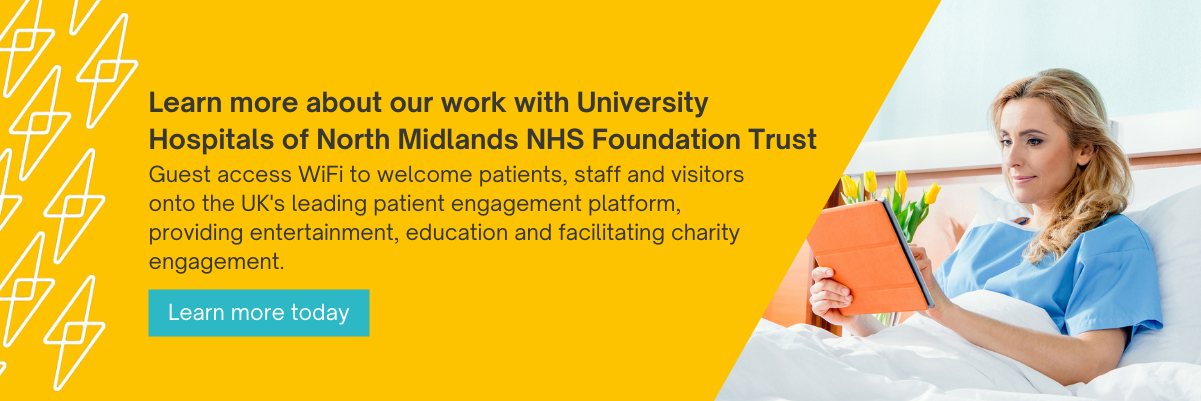WiFi SPARK's work with UHNM NHS Trust has been celebrated with an article in the Guardian
7 minute read | 14/09/2021

In association with Media Planet and Digital Health, WiFi SPARK and University Hospitals North Midlands NHS Trust (UHNM) have published an article highlighting how technology can improve the wellbeing of patients and staff, and reduce the isolation felt when in hospital with the support of NHS Trusts and charities.
Looking to the solution provided by WiFi SPARK and funded by UHNM Charity at UHNM, the Director of Communications and Charity at UHNM, Lisa Thompson, WiFi SPARK CEO, Matt O’Donovan and WiFi SPARK Product Manager, Steven Killick, discuss the benefits and advanced functionality facilitated by patient engagement technology and how it continues to make a difference to people's lives.
The article comes as the NHS has made a concerted effort to digitally transform healthcare and patient engagement. Published in the Guardian on the 14th of September, you can read the full piece below.
Digital support is vital to aid patient recovery
Offering hospital patients access to comprehensive digital technologies and online facilities can play a crucial role in helping them through the recovery process
By Mark Nicholls
Keeping patients occupied, entertained and informed during hospital stays is recognised as a critical component in the recovery process.
While not all patients will be well enough to watch TV, speak to relatives or listen to music, many –who may otherwise be bored or feel isolated – need to be stimulated as they recuperate.
A major challenge for hospitals has been how to deliver this in a personalised, cost-effective, way that does not leave patients out-of-pocket, yet enables them to continue to lead their “digital lifestyles” while incapacitated.
Better engagement
Matt O’Donovan, Founder and Chief Executive Officer of WiFi SPARK, believes offering patients digital services provides a degree of normality, yet also aids their wellbeing and recovery.
“In a home environment we have entertainment, communications and the ability to conduct a lot of our lives online, at our fingertips. Even when we travel, we have that in a hotel.
“But in many NHS Trusts, the options for running our digital lives are impacted by the inability to have access to those services.”
He says better digital engagement for patients can reduce feelings of isolation while allowing them to do much of what they expect to be able to do at home.
In addition, providing information about their condition, treatment and the hospital wards they are on enables patients to better interact with healthcare staff and feel integrated with the environment.
App-based platform
WiFi SPARK has developed the SPARK® Media app-based [platform, which is available to patients through their tablets, phone and laptops, or on hospital-provided equipment.
O’Donovan says: “They could be in bed for three days or three weeks. To not have those facilities available is prejudicial to their recovery.
“This platform is all about enabling patients to conduct their digital life through a basic amenity in a very easy-t-deliver platform in a healthcare environment.”
Via the platform, patients can watch TV and videos, play music, or make video calls for free. It has an ergonomic design relevant to patients of all ages and their location within the hospital.
“We have a different look and feel in the paediatric ward to a generic ward,” he adds. “The system is tailored to meet the requirements of each part of the hospital.”
Technical knowledge
Alongside the educational and clinical information, the free platform gives access to what is happening in the hospital, hospital radio and how patients can get involved with charities. The amenity also extends to family members, visitors and hospital staff.
Product Manager Steven Killick says the app is suitable for different levels of technological knowledge, with ‘big buttons and clear text’ user-friendly contrasting colour schemes and for patients with dementia, includes reminiscent services such as music memories.
The company works with several NHS Trusts and has recently installed the platform with University Hospitals of North Midlands at the Royal Stoke and County Hospital in Stafford, which have 1,400 beds and 12,000 staff.
Positive environment
The Trust’s Director of Communications and Charity Lisa Thompson, says: “This platform gives everybody who comes into the hospital free access to WiFi and the entertainment systems.
“Scientific evidence says that patients will recover faster, and their outcomes will be better if in a positive environment, and this is a crucial part of that.”
Feedback has been positive with around 700 people a day initially accessing the service prior to promotion. She emphasises that WiFi SPARK had worked closely with the Trust to meet high standards of internal governance in terms of cyber security.
The system can also maintain communication for patients if a ward becomes closed to visitors because of COVID-19 restrictions, or due to other bugs such as norovirus.
WiFi SPARK’s work with UHNM and its charity has been one of mutual support and growth. Designing the tailored solution has enabled patients, staff and visitors to find engagement and entertainment during hospital stays. If you would like to learn more about WiFi SPARK’s work with the University Hospitals of North Midlands, read the full case study via the link below.
About the author
Rebecca O'Donovan
Becky is the Marketing Director at SPARK TSL, of whom she has worked for since 2012. She is responsible for high-level marketing strategy focusing on lead generation and aiding the vision of the business to ensure business growth.
More articles by the author
Related articles
 Healthcare Industry
Healthcare Industry
The Holistic approach to Healthcare WiFi
The Future of Patient Engagement by Tracy Scriven, Director of Healthcare UK.
.png?width=386&height=180&name=wifi-spark-thank-you-poster.pdf%20(600%20x%20300%20px).png) Company News
Company News
We raised £2,602 for Alzheimer's Society with your help | SPARK TSL
 Company News
Company News
WiFi SPARK's Charity of the Year 2022 - St Petrock's | SPARK TSL
Each year WiFi SPARK selects a charity to raise money for across the year, with previous years seeing us ...


